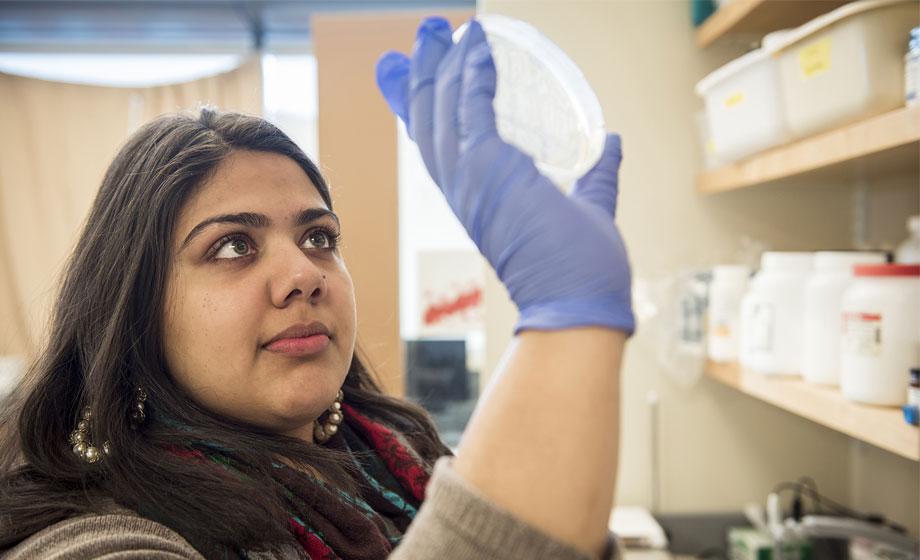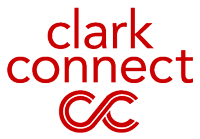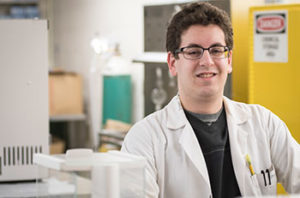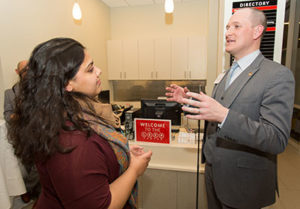Faculty mentorship, alumni connection — and a biotech job

As an undergraduate biology major and chemistry minor at Clark University, Christie Joyce ’16, M.S.’17, worked in research laboratories on campus. She wanted to explore career options besides academia and research, as well as address a gap at Clark, so she founded a research journal managed, edited, designed and produced by Clark undergraduates.
Joyce shaped the identity of the Scholarly Undergraduate Research Journal (SURJ) during its first two years, serving as editor-in-chief, with assistance from 20 undergraduate deputy editors, designers and copy editors; 40 undergraduate peer reviewers; 16 graduate student reviewers; 22 faculty reviewers; and a 10-member faculty advisory board.
 “I learned a lot about publishing and the process of peer reviewing and copy editing, but I also learned a lot about managing a huge team of people and starting from the ground up,” Joyce says. “It was definitely a challenging process, but it was really rewarding.”
“I learned a lot about publishing and the process of peer reviewing and copy editing, but I also learned a lot about managing a huge team of people and starting from the ground up,” Joyce says. “It was definitely a challenging process, but it was really rewarding.”
Now, after completing the fifth-year Accelerated B.A./M.S. Program in Biology, Joyce similarly has taken initiative to land her first job. She recently began working as a clinical trial associate for Corbus Pharmaceuticals, which aims to find cures for rare inflammatory diseases. Dr. Mark A. Tepper ’79, who earned his doctorate at Columbia University in 1985, is founder, president and chief scientific officer of the Norwood, Mass., company, which the Boston Business Journal has called “the top-performing public biotech in Massachusetts.”
By advising and advocating for Clark students interested in learning about and pursuing careers in the sciences, particularly biopharma, Dr. Tepper is an active supporter of the University’s new ClarkCONNECT initiative, which brings together students with alumni, faculty, parents and friends for mentoring, career exploration, internships and job opportunities.
Joyce met Dr. Tepper at a Boston networking event hosted by Corbus in August 2016. She learned about the event from University Advancement, which had reached out to students in Clark’s Biology and Chemistry departments.
“I met Dr. Tepper at the Corbus networking event, and he encouraged me to apply to Corbus when I was ready; I was starting my master’s at the time and unable to commit to a job or internship then,” she recalls. “I kept in touch with Corbus, and, as graduation approached, applied and began the interview process in March 2017.”
Joyce now works on Corbus’ clinical development team, which is developing the company’s lead drug, lenabasum, for the treatment of systemic sclerosis, or scleroderma, a chronic autoimmune disease that affects an estimated 100,000 Americans. “My job so far has been to work with the vendors needed to run the trial and to assist the team with making sure everything is ready to go for the trial to begin,” she says.

“I’m a big believer in alumni reconnecting with Clark to support the mission of the University by extending the learning opportunity for students,” says Dr. Tepper, who also hired a Clark undergraduate chemistry student, Devon Fontaine ’17, to intern at Corbus last year. “We’re fortunate that Clark turns out so many talented young scientists like Christie and Devon, who are well trained and offer fresh ideas and passion to Massachusetts’ growing biotech industry.”
Joyce’s undergraduate and graduate experience at Clark — where she worked not only on SURJ but also in biology research — prepared her significantly for her career, she says.
“Having a biology background has been quite helpful in understanding the processes and nuances involved in clinical research. My job requires an understanding of biology and how the drug we are testing might be working, which is related to my academic training from the lab,” Joyce says. “A lot of the job is also about reaching out and negotiating with vendors, as well as being organized and tracking different study sites, which is similar to what I had to do in building and running SURJ.”
Joyce credits a number of people at Clark for helping her lay the groundwork for a career at Corbus — for one, Néva Meyer, assistant professor of biology. Joyce worked in Meyer’s lab for more than three years, studying the evolution of centralized nervous systems and how they develop in the marine worm Capitella teleta.
“Working for Néva Meyer as a graduate student was key in helping me develop into the person I am today,” Joyce says. “She pushed me to be a better scientist by critically thinking about the information at hand and being an effective communicator to wide audiences through posters and presentations. Working in a rigorous lab environment reinforced my strong work ethic, and working for Professor Meyer taught me to hold myself to the highest standards in the work that I produced. I learned a lot about scientific and academic conventions and expectations, which are all invaluable lessons I received, and are helping me every day in my new job at Corbus.”
Michelle Bata, associate dean and director of the LEEP Center, also mentored Joyce, encouraging her “to explore alternative careers in science — so I wasn’t limited to medicine or research — and was the reason why I started SURJ,” Joyce says.

Deborah Robertson, Warren Litsky ’45 Endowed Chair and professor of biology, helped Joyce learn the statistics that informed her master’s thesis. “She was also one of the first science professors to support SURJ when I proposed the idea to her, and she actively supported us by helping with peer review training every year. Her ongoing support in that initiative is invaluable.”
Joyce also valued Denis Larochelle, associate professor of biology and director of the Biochemistry and Molecular Biology Program, as a mentor. “Professor Larochelle really cares about students in the sciences gaining diverse practical experiences so that they can understand the options in industry instead of being limited to academia or medicine. I was able to work with him on improving some of those connections and resources for Clark students, and developed a curriculum for a course that he is going to teach next year, which is about teaching students about different opportunities in the pharmaceutical industry.”
Overall, such experiences “allowed me to understand biology at a different level, compared to just taking classes,” Joyce says, “and prepared me to work in the field of research and industry.”
Clark University has launched a major initiative that brings together students, alumni, faculty, parents and friends to expand students’ knowledge and prepare them for a successful career launch. ClarkCONNECT provides opportunities for mentoring, career exploration, and internship and job opportunities. Learn more.


